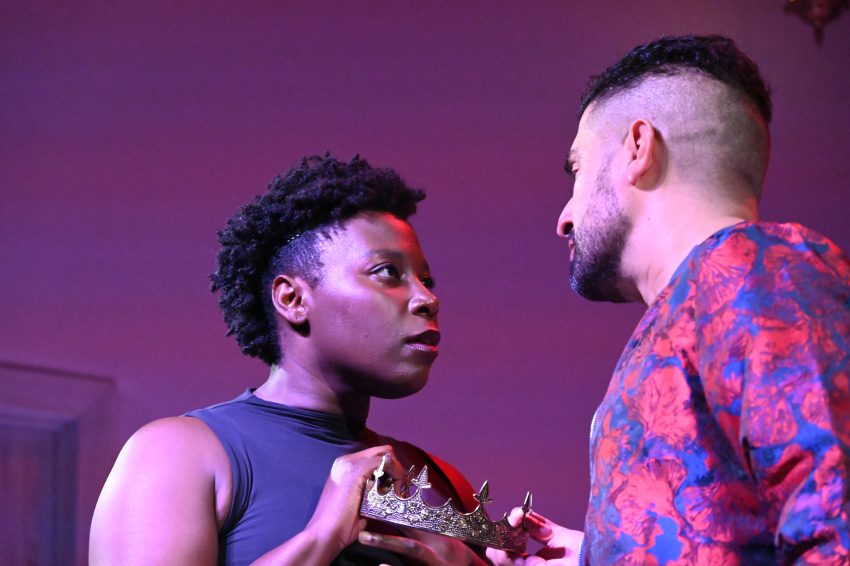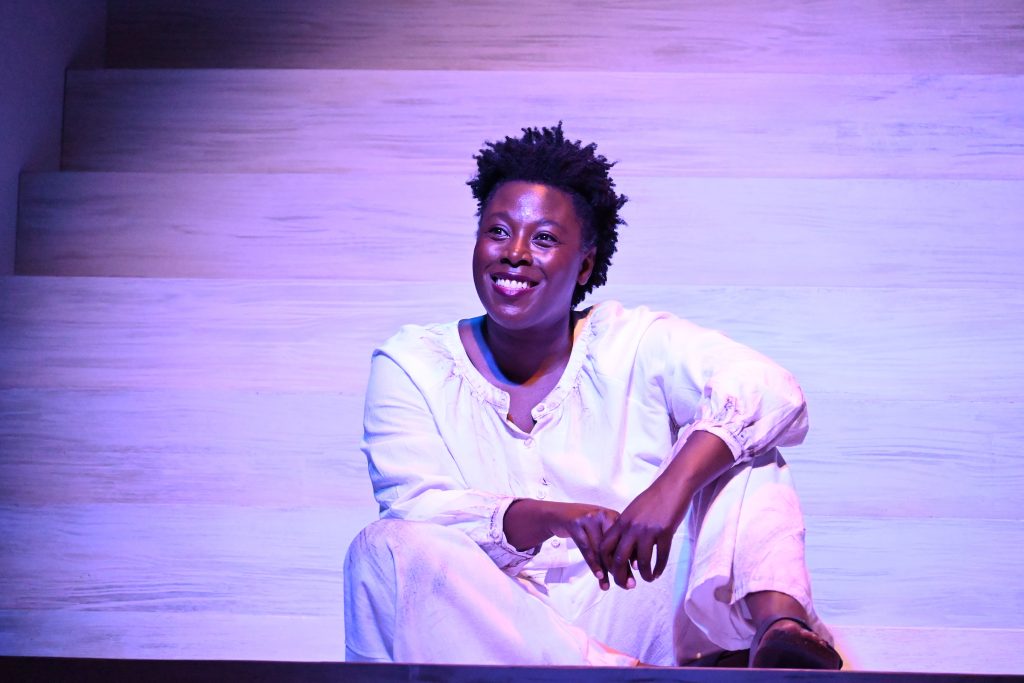
“Richard II” Exposes ‘Back to the Future’ Politics—at Magic
Naomi Iizuka’s ‘Play On Shakespeare’ Pits Loyalty vs. Betrayal
by Kim Waldron
You may get lost during this tale of a tragic king, but if you can follow the story, it offers plenty of rewards. This work is less pageant and more psychology than Shakespeare’s other historical plays. Sure, there’s swords, beheadings, and an unworthy king. But it’s the emotions and ideas we feast on—loyalty, betrayal, greed, fear, a mother’s ferocious love. It’s a tragedy, but not a simple one.
We choose a live play over a Marvel movie because we prefer to think. There are questions to ponder in “Richard II”: When is revolt justified? When is it treason? How does power change a character? What does politics cost our character?
The sleek, simple set consists of a broad, beautifully lit stairway, spilling down to the stage. The props are simple, but nothing more is needed. Brilliant lighting and sparkling projections add fire, including a striking sequence involving a mirror and its subsequent shattering, and a magnificent, glimmering death scene.

The co-producer, “Play On Shakespeare,” makes it clear that they never adapt—they “translate.” Because the English language has changed in almost half a millennium, parts of the original scripts can only be understood today with help.
“Play On Shakespeare” has commissioned American playwrights to go through each Shakespeare play, line by line and “translate” where needed. Naomi Iizuka has done an excellent job of making the lines clear, while maintaining meter, rhyme, and imagery.
The program notes that this is a “lean” production, and therein lies a problem. So much has been cut that the story can be hard to follow. When we lose the understanding of why characters act as they do, we lose the depth of the play. My seatmate, who was unfamiliar with the play, never caught up with the plot.
Almost every character is utterly transformed over the course of the play, for the better or the worse. We must know the characters wholly for this to work. We must feel Bolingbroke (Juan Amador) is blunt and likeable and Richard II (Jeunée Simon) is indecisive and irritating to get the impact when straightforward Bolingbroke twists, and Richard becomes sympathetic. We need to be jolted by the understanding that the treachery takes place within a family, between cousins, parents, nephews, and uncles. They are all at each other’s throats.
The actors work hard but are burdened by playing multiple characters back-to-back. Someone is put to death and seconds later is on their feet in another role, making for confusion. The constant character changes and reduced script sometimes force them into a one-note approach. Subtlety is lost.
“Richard II” bestows two lessons: First, beware of cousins. Second, decide and then demonstrate what you believe is patriotic on November 5.
“Richard II” by William Shakespeare, in a modern verse translation by Naomi Iizuka, directed & adapted by Dr. Karina Gutiérrez, scenic design by Tanya Orellana, lighting design by Alejandro Acosta, at Magic Theatre, Fort Mason, San Francisco. Info: magictheatre.org – to September 8, 2024.
Cast: Juan Amador, Catherine Castellanos, Nora El Samahy, Kina Kantor, Jeunée Simon, Mia Tagano, and Ogie Zuleta.
Banner photo: Jeunée Simon (King Richard) & Juan Amador (Bolingbroke). Photos by Jay Yamada
Note: Shakespeare fans and language lovers can visit the “Play On Shakespeare” website to see modern translations of The Bard:
https://playonshakespeare.org/demos/